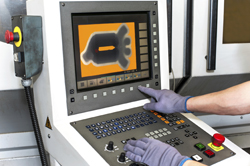Manufacturing intelligent machine tools
The tooling and manufacturing industries are faced with increasing competition from low-labour–cost countries. Intelligent tooling systems based on advanced coatings with embedded sensors promise enhanced product quality and versatility with reduced time-to-market and manufacturing costs.The EU-funded project 'Intelligent and customized tooling' (IC2)(opens in new window) advanced technologies to a new level and provided a software tool for business model development to overcome price-based competition. Scientists focused on injection moulding tools but results are applicable to a variety of other tools, dies and moulds.Researchers integrated coatings with increased wear resistance, friction control and thermal management with embedded surface sensors for tool and process monitoring. The historically challenging adhesion of sensors to an aluminium oxide coating system was overcome. Advanced coatings and sensors were incorporated in hybrid manufacturing cells combining the precision and performance of subtractive operations (milling, grinding and polishing) with the geometrical freedom of additive manufacturing.The final demonstration, production of an injection moulding tool, showcased the optimised manufacturing operation sequence system and demonstrated the benefits in tooling production, operation and maintenance. Computer numerical control of milling together with additive manufacturing produced an optimised machine tool with integrated conformal cooling. The latter reduces thermal impact on the tool and enhances the uniformity of temperature distribution within it, reducing stress on the mould. It thus increases mould lifetime and reduces maintenance costs. In addition, less expansion and contraction of the mould facilitates the use of new and improved coatings to decrease friction and increase resistance to wear. The coatings enhance mould surface properties for improvements in product quality.Including 8 small and medium-sized enterprises (SMEs), the 16 partners in the consortium produced numerous demonstrators of the various technologies. In addition, a toolbox was created to guide SMEs through the complexities of business model development. IC2 technological advancements and business models are poised for major impact on the competitiveness of the EU tooling industry and the manufacturers who use those tools, encompassing a huge and vulnerable sector of the EU economy.







